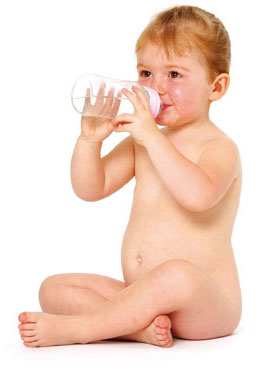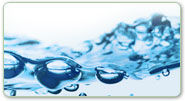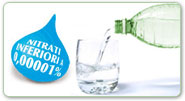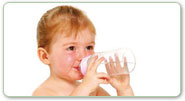NEWBORN
BABIES DIET
Life depends on water and the human body is made up of 70% water.
Therefore water is essential for our health and controls many vital processes of human body: it regulates body heat, lubricates lungs, eyes and skin tissues, stimulates digestive process and diuresis and help the elimination of waste substances. Consequently it is important to choose the right kind of water for a healthy and balanced diet, especially for newborn babies.
This is the reason why only waters with a concentration of nitrates lower than 10 mg/lt can indicate on the label “suitable for newborn babies and for the preparation of baby food ”. D.L 542/1992, art.6
MEDICAL RESEARCH
The following are parts of the medical researches “Diet in pregnancy” and “Pregnancy and breastfeeding” edited by:
Dott.ssa Maria Grazia Doria
Servizio Igiene Alimenti e Prevenzione ASL Città di Milano
Dott.ssa Hellas Cena - Dott.ssa Anna Toselli
Sezione Scienza dell’Alimentazione, Università degli Studi di Pavia
Dott.ssa Anna Bagnara
Ambulatorio di Dietologia, Ospedale Luigi Sacco di Milano
“In pregnancy there is an increased demand for water to meet the needs of the foetus and amniotic fluid. Adequate supply of water allows proper tissues hydration, facilitates renal function, prevents cystitis and promotes intestinal motility. Suggestions: drink at least a litre and a half of water per day, preferably non-carbonated, rich in calcium, low sodium, particularly low in nitrates (WHO limit: 10 mg/lt) to avoid the risk of methaemoglobinemia for unborn child”.
“The unborn baby steals the calcium from the mother’s skeleton, which is harmful not so much for the child but for the mother. An important role in calcium metabolism for the foetus, is played by the placenta that contains one mg per gram. In adult women the physiological requirements of calcium are 800 mg a day, which increase of 400 mg a day from the beginning of pregnancy and during the whole period of breastfeeding (editor’s note). The adequate daily intake of calcium in milk and dairy products can be integrated by calcium-rich mineral water”.
“The unborn baby steals the calcium from the mother’s skeleton, which is harmful not so much for the child but for the mother. An important role in calcium metabolism for the foetus, is played by the placenta that contains one mg per gram. In adult women the physiological requirements of calcium are 800 mg a day, which increase of 400 mg a day from the beginning of pregnancy and during the whole period of breastfeeding (editor’s note). The adequate daily intake of calcium in milk and dairy products can be integrated by calcium-rich mineral water.”
“During pregnancy the body adapts itself to a new physiological state. Changes in digestive functions due to the increased metabolic needs, cause a better absorption of calcium, iron and vitamin B12. It is useful to recommend for the whole period of pregnancy the intake of two litres of low mineral content water, bacteriologically pure and controlled.”
BABIES DIET
Life depends on water and the human body is made up of 70% water.
Therefore water is essential for our health and controls many vital processes of human body: it regulates body heat, lubricates lungs, eyes and skin tissues, stimulates digestive process and diuresis and help the elimination of waste substances. Consequently it is important to choose the right kind of water for a healthy and balanced diet, especially for newborn babies.
This is the reason why only waters with a concentration of nitrates lower than 10 mg/lt can indicate on the label “suitable for newborn babies and for the preparation of baby food ”. D.L 542/1992, art.6
MEDICAL RESEARCH
The following are parts of the medical researches “Diet in pregnancy” and “Pregnancy and breastfeeding” edited by:
Dott.ssa Maria Grazia Doria
Servizio Igiene Alimenti e Prevenzione ASL Città di Milano
Dott.ssa Hellas Cena - Dott.ssa Anna Toselli
Sezione Scienza dell’Alimentazione, Università degli Studi di Pavia
Dott.ssa Anna Bagnara
Ambulatorio di Dietologia, Ospedale Luigi Sacco di Milano
“In pregnancy there is an increased demand for water to meet the needs of the foetus and amniotic fluid. Adequate supply of water allows proper tissues hydration, facilitates renal function, prevents cystitis and promotes intestinal motility. Suggestions: drink at least a litre and a half of water per day, preferably non-carbonated, rich in calcium, low sodium, particularly low in nitrates (WHO limit: 10 mg/lt) to avoid the risk of methaemoglobinemia for unborn child”.
“The unborn baby steals the calcium from the mother’s skeleton, which is harmful not so much for the child but for the mother. An important role in calcium metabolism for the foetus, is played by the placenta that contains one mg per gram. In adult women the physiological requirements of calcium are 800 mg a day, which increase of 400 mg a day from the beginning of pregnancy and during the whole period of breastfeeding (editor’s note). The adequate daily intake of calcium in milk and dairy products can be integrated by calcium-rich mineral water”.
“The unborn baby steals the calcium from the mother’s skeleton, which is harmful not so much for the child but for the mother. An important role in calcium metabolism for the foetus, is played by the placenta that contains one mg per gram. In adult women the physiological requirements of calcium are 800 mg a day, which increase of 400 mg a day from the beginning of pregnancy and during the whole period of breastfeeding (editor’s note). The adequate daily intake of calcium in milk and dairy products can be integrated by calcium-rich mineral water.”
“During pregnancy the body adapts itself to a new physiological state. Changes in digestive functions due to the increased metabolic needs, cause a better absorption of calcium, iron and vitamin B12. It is useful to recommend for the whole period of pregnancy the intake of two litres of low mineral content water, bacteriologically pure and controlled.”


Policlinico di Ponte S. Pietro
Policlinico di Ponte S. Pietro Conclusioni
della Salute











